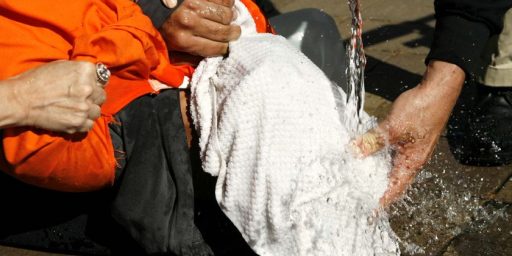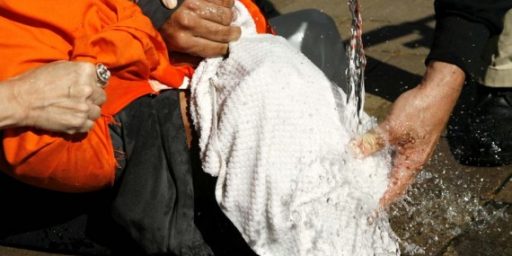Obama Invokes State Secrets Privilege
 Meet the new boss — same as the old boss:
Meet the new boss — same as the old boss:
In a closely watched case involving rendition and torture, a lawyer for the Obama administration seemed to surprise a panel of federal appeals judges on Monday by pressing ahead with an argument for preserving state secrets originally developed by the Bush administration.
In the case, Binyam Mohamed, an Ethiopian native, and four other detainees filed suit against a subsidiary of Boeing for arranging flights for the Bush administration’s “extraordinary rendition” program, in which terrorism suspects were secretly taken to other countries, where they say they were tortured. The Bush administration argued that the case should be dismissed because even discussing it in court could threaten national security and relations with other nations.
During the campaign, Mr. Obama harshly criticized the Bush administration’s treatment of detainees, and he has broken with that administration on questions like whether to keep open the prison camp at Guantánamo Bay, Cuba. But a government lawyer, Douglas N. Letter, made the same state-secrets argument on Monday, startling several judges on the United States Court of Appeals for the Ninth Circuit.
“Is there anything material that has happened” that might have caused the Justice Department to shift its views, asked Judge Mary M. Schroeder, an appointee of President Jimmy Carter, coyly referring to the recent election.
“No, your honor,” Mr. Letter replied.
Judge Schroeder asked, “The change in administration has no bearing?”
Once more, he said, “No, Your Honor.” The position he was taking in court on behalf of the government had been “thoroughly vetted with the appropriate officials within the new administration,” and “these are the authorized positions,” he said.
This will, I wager, not be the last time that the change in administration has no bearing. Being responsible for national security is rather different from commenting on it from the outside and entering office tends to make presidents conform to their new role.
Others are more surprised. Even some Obama supporters are letting him have it.
Glenn Greenwald titles his long post on the matter “Obama fails his first test on civil liberties and accountability — resoundingly and disgracefully.”
What makes this particularly appalling and inexcusable is that Senate Democrats had long vehemently opposed the use of the “state secrets” privilege in exactly the way that the Bush administration used it in this case, even sponsoring legislation to limits its use and scope. Yet here is Obama, the very first chance he gets, invoking exactly this doctrine in its most expansive and abusive form to prevent torture victims even from having their day in court, on the ground that national security will be jeopardized if courts examine the Bush administration’s rendition and torture programs — even though (a) the rendition and torture programs have been written about extensively in the public record; (b) numerous other countries have investigated exactly these allegations; and (c) other countries have provided judicial forums in which these same victims could obtain relief.
Kevin Drum: “So Obama is adopting the same expansive interpretation of the privilege as the Bush/Cheney administration, and using it in order to cover up American involvement in torture and rendition programs that have been in the public record already for years and can hardly even be said to be secrets, let alone state secrets that are vital to U.S. national security. This is decidedly not change we can believe in.”
Armando Llorens (Big Tent Democrat): “Holder and the Obama Administration are BSing us on this issue. Unlike some, I believe that there are appropriate situations for application and invocation of the state secrets privilege. I think it serves an important function. The Jeppesen case is about as far a case as one could imagine where the invocation of the state secrets privilege can possibly be deemed appropriate.”
Andrew Sullivan: “This is a depressing sign that the Obama administration will protect the Bush-Cheney torture regime from the light of day. And with each decision to cover for their predecessors, the Obamaites become retroactively complicit in them.”
Thoreau: “The machine is on autopilot, and nobody who wears that Ring is going to toss it into the volcano.”
Cernig: “Thus, the Obama administration collectively become accessories to the Bush administration’s crimes. In my opinion, any cabinet member who had an ounce of spine and an ounce of belief in the rule of law for all would resign over this travesty of justice. Watch for an utter lack of that.”
Ron Chusid calls this a “disappointing move” but argues “While I disagree with what appears to be a general policy from Obama to avoid prosecution based upon the crimes of the Bush administration, this still does not place Obama on the level of those in the Bush administration which actually committed these acts. We can be disappointed in this decision by the Obama administration to hinder prosecution for past acts while still applauding their decision to refrain from such actions in the future.”
Daren Hutchinson points out that, “If the Obama administration wished to drop the policy in this particular case, it would have done so prior to today’s oral arguments. Most lawyers, however, do not shift positions in order to lose a case. Furthermore, the privilege can help secure victories in future cases; accordingly, DOJ will continue asserting it.” He adds, “The DOJ’s position is less about creating a wall of governmental secrecy; instead, it represents a powerful litigation strategy. Although acceptance of the privilege by courts results in the dismissal of anti-torture litigation, very few lawyers would forgo such a powerful strategic device.”
That strikes me as exactly right. Obama’s president now. He has ostensibly discontinued the policy of “extraordinary rendition,” the extent of which we will likely never know. But he’s neither going to compromise national security secrets nor give away potentially useful presidential powers now that he’s in the White House. I’m surprised anyone’s surprised by that.






Once again, the “reality-based” community is shocked by a dose of reality.
There was an interesting article (where was it?) I read not long ago on the continuity in foreign policy between the Obama Administration and the Bush Administration. That’s been the history of American foreign policy and how anybody could have thought differently is puzzling.
I know it’s asking a lot, but perhaps if people could step away from their partisan bastions of ideology, they might recognize that a policy is continued because it’s a good, or at least the best-available, policy.
Policies that effectively deal with a real issue have a tendency, like convergent evolution, to end up functioning the same way and looking pretty much alike.
But the rhinoceros and the unicorn are not examples of convergent evolution, except perhaps for primitive minds.
I felt poorly and went to bed early. Did any reporter ask the President if he has had a chance to read the recent Congressional Budget Office report?
If I may take the liberty of quoting Dr. Joyner:â€
The whole issue pivots on whether there is any “national securities secretes†that can be compromised. Strikes me that kidnapping (or as we used to say in The Bronx, “a snatchâ€) is a crime that is internationally recognized. To quote ACLU lawyer Wizner, referenced by Glenn Greenwald (linked above by Dr. Joyner):
There are no state secretes here that I can identify, other than the identification of the trail that lead to this man being identified as a terrorist target. And if he truly is a terrorist, why the fear of revealing such information? And if he not a terrorist, the most that can be said is that he is political dissident, and why is he in an Egyptian jail?
As to this bon mot:
The phony black beast of National Security is dealt with above. Perhaps I am wrong, and would love to hear cogent arguments to the contrary, but it strikes me that you strengthen “presidential powers†by illuminating when they are wrongly used.
Neither you nor I have any clue what secrets are involved here. The fallback answer is always “sources and methods.”
One can oppose rendition — as I do — and still not want to compromise sources and methods — i.e., get people killed — in civil suits about them. One can simply abandon the practice.
That’s how you strengthen liberty. Power is preserved by secrecy.
I think we have a pretty good idea given the available information. But if it’s recognized as the the truth what is the inevitable next step?
Prosecutions?
I wrote such an article myself at Pajamas media a few weeks back… suggesting among other things, that Obama, once exposed to reality would change his views from the leftist firebreather, to more along the lines of Bush himself, thus validating Bush.. the man he spent so long trying to deride.
This is a revealing line:
“Even some Obama supporters are letting him have it.”
Why do you sound surprised that people who probably voted for Obama are ready to rip him a new one? Greenwald for example… you really think he’d cut Obama slack on civil liberties and the rule of law?
The finger should be pointed at the courts, not the unrealistic expectations of partisans. The SCOTUS has given present and former enemy combatants access to the courts to decide difficult decisions of which it has no experience or precedent to assist. 200 cases pending in the D.C. Circuit.
In the appeal of the judge’s order to release anti-Chinese jihadists onto the streets of America, the D.C. Circuit discussed waiting for a new President to see if he might take the cup away from them. Why? The law is the law. The courts are in charge of detention policy now. Don’t be surprised if the political branches stick the courts with the costs.
After the last 8 years you’d think Obama’d know better than to do anything the way the GOP did it.
http://uk.reuters.com/article/usPoliticsNews/idUKTRE5187SK20090209
There’s no surprise here that their are sensitive state secrets, but this article shows that the new administration is at least going to review exactly what is sensitive. I’ll pass judgment when we see what is released, and whether the Bush Administration held secrets for no good reason.
Ed,
“Why do you sound surprised that people who probably voted for Obama are ready to rip him a new one? Greenwald for example… you really think he’d cut Obama slack on civil liberties and the rule of law?”
Because during the past 8 years, Republican pundits were generally pretty reliable in supporting anything Bush the Younger did, and most Republicans are therefore amazed that Democrats are more willing to stand up to the President for their principles than they did.
I’m laughing at everyone who thought Obama would be different on this issue.
For all of you people I’m laughing at, I refer your to John Emerich Edward Dalberg-Acton, 1st Baron Acton,
Gee Steve, given the facts don’t you think your laughing is a bit premature?
That the Obama Department of Justice would not have time to review this case is apparent, and it chose instead to let the court case proceed as outlined by the Bush Administration. As pointed out by Franklin(above), the Department of Justice plans to review past Bush Administration’s use of State Secretes Privilege to circumvent civil challenge of some of its action in the War of Terror. There is time, for the Court has not yet ruled, and there is a distinct possibility that the case may ultimately wind up in the Supreme Court.
Over at Balkanization (Center Left Judicial Blog) David Lubin takes a swipe at this State Secrete Privilege. To wit:
And there lies Dr. Joyner’s argument, the case cannot go forward because the documents contain secretes, while the facts, know to all, are meaningless.
Over at The Volokh Conspiracy(Center Right Judicial Blog) not much to chew on, but Jonathan Adler does abstract the David Lubin post, picking some of the more inflammatory paragraphs. There are some links worth perusing for those who wish to expand their view point.
For those who prefer a more in depth legal analysis, albeit perhaps slanted, Amanda Frost views the issue from a Separation of Powers perspective. Caution, the link is to an abstract, with a down loaded pdf file.
Complex problems deserve some degree of simplification. What is being argued is whether secretes are more valuable than truth, and whether criminality can be hidden to prevent national embarrassment. David Lubin points out the irony of it all:
Sigh, where is that guy who said that if we do not learn from our mistakes, we are bound to repeat them, when we really need him.
you would think by now people would realize a politician will say anything to get elected. It doesn’t mean a thing say one thing do another. you just never learn the republicrats LIE, no “change” there.
Well bitsy, let me tell you something about the difference between Obama & Bush. Less than a month into his presidency, Obama has already appeared at several public events where tickets were available to all, first come, first served. No room scrubbing, no loyaly tests, no police waiting to remove anyone who might dissent.
Just the President talking to Americans from all walks of life, something your chicken hearted hero did not have the guts to do.
Steve Verdon: I’m laughing at everyone who thought Obama would be different on this issue.
Another revealing statement.
Do you think the criticism being levelled at Obama is motivated by the fact people thought he would be different?
If you really think the room wasn’t being scrubbed, you’re more gullible than I took you for… that already being substantial.